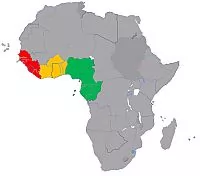Cote d'Ivoire's investment promotion body, Centre de promotion des investissements en Côte d'Ivoire (CEPICI), has released figures showing that over 5,700 enterprises were created up to the end of Q3 2016. This equates to 19% growth compared to the same period in 20151. These are just the latest in a number of recently released figures that show Cote d'Ivoire to be the current destination of choice in Sub-Saharan Africa, particularly among francophone African countries.
- CEPICI's growth figures aren't so surprising seeing as Cote d'Ivoire was shown by an IMF report to have the strongest growth projections for 2016-17 in Sub-Saharan Africa2. Growth for the period is expected to be 8% as compared to the regional mean of 4.5%3. The report states that some reasons for the positive outlook include the country's relative sheltering from falls in global commodity prices, especially compared to oil exporting countries. The stability of the CFA franc due to its pegging against the euro as opposed to the volatility of standalone currencies such as the naira are also cited.
- The continued increase in political stability following the end of the violence in 2011 has been a big contributing factor to the growth of the private sector in Cote d'Ivoire. One would expect that confidence within the business community would fall during election periods, however, this has not been the case in Cote d'Ivoire. The CEPICI figures have shown sustained growth despite elections in November 2015, October 2016 and December 2016. Since 2014, many companies that abandoned the country during the violence have begun moving back and this trend has continued4 to the current day.
- Financial instability of some of the neighbours of Cote d'Ivoire, especially Ghana, have also added to the creation of industry. Ghana has been suffering from low growth and high inflation for most of 2016 and reports have claimed that many companies have decided to take advantage of the favourable economic conditions across its borders5.
Outlook
The prospects continue to be extremely positive for Cote d'Ivoire. It will remain an attractive opportunity for investors for at least the next 18 months – two years as the instability in commodity prices continues to affect many of its regional peers in the near term. Its own growth in the oil and gas sector is extremely promising, so long as it learns lessons from the missteps of countries such as Nigeria and Ghana.
The Ouattara administration must make sure that it borrows sensibly and within its means while it seeks to carry out major infrastructural developments in the country. Government debt is currently at 48.9% of GDP (exactly the average for SSA) and is expected to remain stable for the 2016-17 period though it must be noted that these figures were compiled before the announcement of a number of financing agreements with various partners and upcoming plans such as the US$159m "Special Plan" of President Ouattara for Abobo.
Footnotes
1 http://news.abidjan.net/h/606741.html
2 http://abidjantv.net/economie/la-cote-divoire-enregistre-les-meilleurs-chiffres-en-afrique-subsaharienne-dans-la-croissance-economique/
3 https://www.imf.org/external/pubs/ft/reo/2016/afr/eng/pdf/sreo1016.pdf
4 http://www.reuters.com/article/us-ivorycoast-investment-analysis-idUSBREA180NS20140209
5 http://xliveafrica.com/2016/06/17/importers-slam-gipc-over-ivory-coast-relocation-reports/
The content of this article is intended to provide a general guide to the subject matter. Specialist advice should be sought about your specific circumstances.

